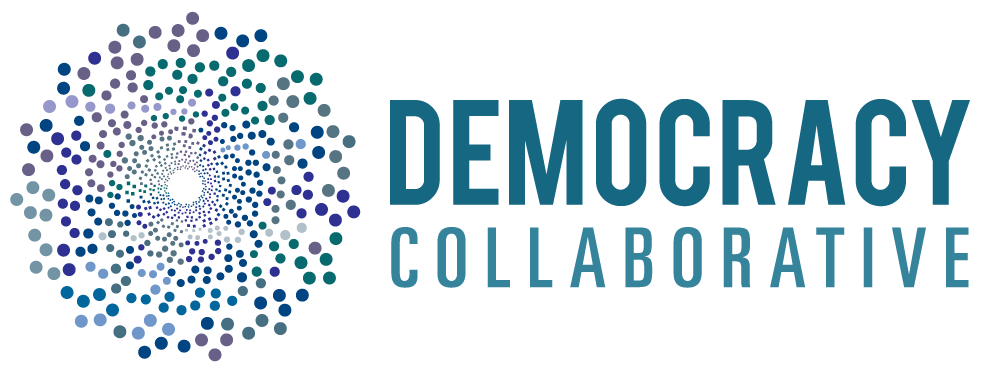On continuing the legacy
The Democracy Collaborative announced an upcoming change in leadership. Below is a statement from incoming President, Joe Guinan, on the transition and his time with the organization.
I could not be more excited to have the opportunity to share in the leadership of The Democracy Collaborative during its next phase. I know we can make a vital and unique contribution in providing practical economic solutions to the deep problems we face as a society. Working with my colleague Stephanie McHenry, our new Chief Executive Officer, we will bring new energy and focus to TDC’s mission of political-economic institutional change. We want to see a new era of Community Wealth Building and democratic economy policy and strategy, to show that there are real alternatives, powerful answers that already work on the ground and can now be implemented at scale, here in the United States and worldwide.
Stephanie and I know we have an extraordinary legacy to continue. We are prepared to fashion new responses to ongoing and longstanding challenges—not least to the abiding problem of race in America, which is urgent and demands solutions.
Growing up in a small manufacturing town in the North of England, the ravages of economic difficulty and deindustrialization were all around. Thatcherism greatly sharpened my sense of crisis. Being Irish in Britain during “The Troubles”—the low intensity war that raged in the North of Ireland and spilled over periodically to the mainland—also gave me a certain perspective on the operations of the British state. My family background is working class, but I was deeply fortunate—there were always books around, and newspapers and ideas. I recall a steady stream of Irish republicans, trade unionists, foreign diplomats, even African freedom fighters who would come to see my parents, bringing international and global perspectives, representing history in the making. Our violent, unequal, and unjust system was visible to me from childhood as a threat to important values—something to be challenged and opposed, eventually replaced.
The Democracy Collaborative and its work came as a revelation. A recent immigrant to the United States, I had been working as a journalist when I answered an advertisement for a researcher position for Gar Alperovitz, TDC’s co-founder, on what was to become his book, America Beyond Capitalism. Working for four years in Gar’s attic, I was given what I consider to be among the best training in political economy anywhere. I was presented with a bold new way of seeing and understanding the institutional power relationships at the heart of our economic system, and the tools to set about changing them.
Once Gar’s book manuscript was finished, I went off to do other things, in the nonprofit and philanthropic world. When in 2007 the financial crisis struck, it was clear that a fundamental shift was occurring. Since then we have been in a period of continual crisis: social, economic, political, ecological. The ordinary fluctuations of the political cycle have proved inadequate to the tasks at hand. Climate change poses a looming existential threat to civilization, to organized human life on the planet, and is intimately linked to the other deep crises we face—of economic inequality and racial injustice. Particularly in America, structural violence is all-pervasive. The political system itself has begun rapidly to decay and break down. Democracy, our right to self-governance, hangs in the balance.
Returning to The Democracy Collaborative in 2012 was a homecoming. Much had occurred in the meantime, including the development of the Evergreen Cooperatives as the prototype for Community Wealth Building practice. In 2015 we launched our Next System Project, which was a call-to-arms: “It’s time to face the depth of the systemic crisis we confront … However difficult the task, however long it may take, systemic problems require systemic solutions.” Since then we have been working hard to highlight the systemic nature of our collective difficulties. What is still missing, however, is systemic solutions on the scale of and commensurate with the challenges ahead.
At the Democracy Collaborative, that is our work to do. To demonstrate in theory and practice different ways of owning and controlling the economy, of building institutional sources of democratic and community and popular power capable of standing up to, offsetting, and displacing the corporate and elite power that governs our current system. And to do so in ways that place much of that power directly in the hands of communities and of marginalized groups and constituencies.
We recognize that the real basis of political power is ownership and control of capital. The right wing has remained in power whether or not it is in office because it occupies key institutions of the economy—the banks, the corporations, the capital markets. We must build our own new sources of countervailing institutional power, from worker and public ownership of enterprise to new forms of planning and democratic participation. We must build a racially just and ecologically sustainable democratic economy to underpin our democratic polity—quickly. Together with the staff, trustees, partners, and supporters of The Democracy Collaborative, we look forward to this journey and to the next phase of our work. We intend to double down on our mission as an action-oriented think tank that delivers on the promise of the democratic economy at this time in history.

